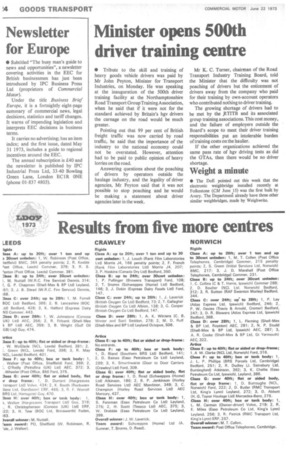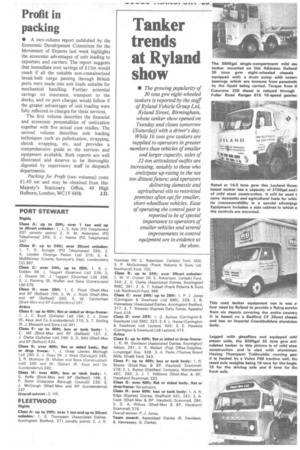Minister opens 500th driver training centre
Page 26

Page 27

If you've noticed an error in this article please click here to report it so we can fix it.
• Tribute to the skill and training of heavy goods vehicle drivers was paid by Mr John Peyton, Minister for Transport Industries, on Monday. He was speaking at the inauguration of the 500th driver training facility at the Northamptonshire Road Transport Group Training Association, when he said that if it were not for the standard achieved by Britain's hgv drivers the carnage on the road would be much greater.
Pointing out that 99 per cent of British freight traffic was now carried by road traffic, he said that the importance of the industry to the national economy could not be overstated. However, attention had to be paid to public opinion of heavy lorries on the road.
Answering questions about the poaching of drivers by operators outside the haulage industry, and the legality of driver agencies, Mr Peyton said that it was not possible to stop poaching and he would be making a statement about driver agencies later in the week. Mr K. C. Turner, chairman of the Road Transport Industry Training Board, told the Minister that the difficulty was not poaching of drivers but the enticement of drivers away from the company who paid for their training by own-account operators who contributed nothing to driver training.
The growing shortage of drivers had to be met by the ,RTITB and its associated group training associations. This cost money, and the failure of employers outside the Board's scope to meet their driver training responsibilities put an intolerable burden of training costs on the haulier.
If the other organizations achieved the same pass rate of hgv driving tests as did the GTAs, then there would be no driver shortage.
Weight a minute
• The DoE pointed out this week that the electronic weighbridge installed recently at Folkestone (CM June 15) was the first built by Avery. The Department already have three other similar weighbridges, made by Weighwrite.
Profit in packing
• A two-volume report published by the Economic Development Committee for the Movement of Exports last week highlights the economic advantages of unit loading to exporters and carriers. The report suggests that immediate cost savings of £15m would result if all the suitable non-containerized break-bulk cargo passing through British ports were made into unit loads suitable for mechanical handling. Further potential savings on insurance, transport to the docks, and on port charges would follow if the greater advantages of unit loading were fully reflected in charges for these services.
The first volume describes the financial and economic potentialities of unitization together with five actual case studies. The second volume describes unit loading techniques such as palletization, strapping, shrink wrapping, etc, and provides a comprehensive guide to the services and equipment available. Both reports are well illustrated and deserve to be thoroughly digested by supervisory staff in despatch departments.
Packing for Profit (two volumes) costs £1.40 net and may be obtained from Her Majesty's Stationery Office, 49 High Holborn, London, WC1V 61-1B. J.D.




















































































































